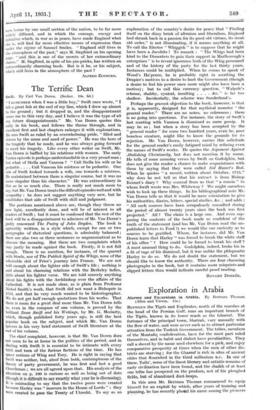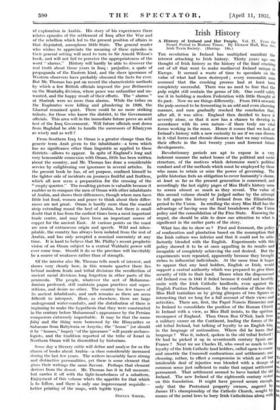Exploration in Arabia
Alarms and Excursions in Arabia. By Bertram Thomas. (Allen and Unwin. 15s.) Alarms and Excursions in Arabia. By Bertram Thomas. (Allen and Unwin. 15s.)
BETWEEN the Tigris and Euphrates, north of the marshes at the head of the Persian Gulf, runs an important branch of the Tigris, known in its lower reach as the Gharraf. The fortunes of the principal town, Shatrah, vary annually with the flow of water, and were never such as to attract particular attention from the Turkish Government. The tribes, members of the Muntafiq confederation, have for the most part ruled themselves, and in habit and dialect have peculiarities. They call a shovel by the name used elsewhere for a pick, and enjoy comparative prosperity at times when the men of other dis- tricts are starving ; for the Gharraf is rich in sites of ancient cities that flourished in the third millenium B.c. In one of these, Tallu', some of the finest literary and artistic remains of early civilization have been found, and the shaikh of at least one tribe has prospered on the produce, not of his ploughed fields, but of abandoned dust-heaps.
In this area Mr. Bertram Thomas commenced to equip himself for an exploit by which, after years of training and planning, he has recently placed his name among the pioneers of exploration in Arabia. His story of his experiences there relates episodes of the settlement of Iraq after the War and of the rebellion which led to the present position of affairs in that disjointed, amorphous little State. The general reader who wishes to appreciate the meaning of these episodes in their general setting will need to turn to Sir Arnold Wilson's book, and will not fail to perceive the appropriateness of the word " alarms." History will hardly be able to discover the real truth about those years in Iraq : prejudice, a spate of propaganda of the Eastern kind, and the sheer ignorance of Western observers have probably obscured the facts for ever. But Mr. Thomas has put on record the characteristic methods by which a few British officials imposed the pax Britannica on the Muntafiq division, where peace was unfamiliar and un- wanted, and the happy result of their efforts. The " alarms " at Shatrah were no more than alarms. While the tribes on the Euphrates were killing and plundering in 1920, the Gharraf remained quiet. There could be no more striking tribute, for those who know the district, to the Government officials. This area will in the immediate future prove an acid test of the Iraq Government. Will future officials sent down from Baghdad be able to handle the successors of Khaiyyun as wisely and as well ?
From Southern Iraq to Oman is a greater change than the generic term Arab given to the inhabitants—a term which has no significance other than linguistic as applied to these districts—allows to appear. In spite of England's long and very honourable connexion with Oman, little has been written about the country, and Mr. Thomas has done a considerable service by enlightening our ignorance in several articles. In the present book he has, of set purpose, confined himself to the lighter side of incidents on journeys fruitful and fruitless, which all now seem a preparation for the crossing of the " empty quarter." The resulting picture is valuable because it enables us to compare the men of Oman with other inhabitants of Arabia, and shows their differences, though where men have little but food, women and pence to think about their differ- ences are not great. Oman is hardly more than the coastal strip extending round the heel of Arabia, but there is small doubt that it has from the earliest times been a most important trade centre, and may have been an important source of copper for the ancient East. At various points on the coast are men of extraneous origin and speech. Wild and inhos- pitable, the country has always been isolated from the rest of Arabia, and has only accepted a nominal suzerainty at any time. It is hard to believe that Mr. Philby's recent prophetic vision of an Oman subject to a central Wahhabi power will ever come true. Should it do so the province will inevitably be a source of weakness rather than of strength.
Of the interior also Mr. Thomas tells much of interest, and shows very clearly how, in this remote quarter there lies behind modern feuds and tribal divisions the recollection of ancient racial divisions long forgotten in other parts of the peninsula. The people, whatever the sect of Mohamme- danism professed, still maintain pagan practices and super- stitions, and desire no other. The country has few traces of its ancient inhabitants, and such remains as there are seem difficult to interpret. Here, as elsewhere, there are large underground water-conduits, and the distribution of these is beginning to make the hypothesis that they were constructed in the century before Muhammad's appearance by the Persian conquerors extremely improbable. It may be that the name falai and the thing were borrowed by the Himyarites or Sabaeans from Babylonia or Assyria ; the "house" (or should it be "houses," buyut) "of the ignorance" will puzzle archaeo- logists, and the tradition reported of the tribe of Israel in Northern Oman will be discredited by historians.
Some day a literary critic will define and analyse for us the charm of books about Arabia—a class considerably increased during the last few years. The writers invariably have strong and distinctive personalities, yet there is some element that gives their writings the same flavour. Perhaps that element derives from the desert. Mr. Thomas has it in full measure, but carries it off with the light-heartedness of a subaltern. Enjoyment of this volume whets the appetite for that which is to follow, and there is only one improvement requisite— better printing of the maps, with legible type.
SIDNEY SMITH.











































 Previous page
Previous page